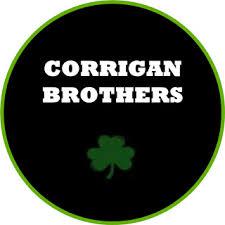Announcing the First Annual Corrigan Brothers Statistics Music Video Medal

The Corrigan Brothers are leading exponents of how to capture the zeitgeist. They wrote about Barack Obama’s Irish roots and helped him win the 2008 American presidential election, about the 2011 Irish presidential election, Luis Suarez’s bites, Vincent Tan’s shirts, and the Irish government’s proposal to give free cheese to poor people. Inspired by a blog post on the 100-year-old debate between Frequentists and Bayesianists, Ger Corrigan thought, “Statisticians should have a song.” This week the Corrigan Brothers release their latest single ‘Bayesian versus Frequentist’ and Dr Brían Merriman, the man behind the StatsJobs StatsBlog, spoke to Ger about story-telling, CERN, Susan Boyle’s cat, and a prize for the best music video.
With a keen eye for a story that merits a song, The Corrigans are quick to react to news. The aim, Ger begins, is to “get to the nub of things … get to the spirit and essence of them quickly”, to “express something in 250 words, no matter what it is”. It’s about identifying the “essential parts”, then finding a rhyming scheme, and adding a melody. The melodies are catchy, with the sense that you’ve heard them somewhere before; as the Corrigan Brothers get a kick out of re-visiting melodies, you probably have. However, using simple, familiar melodies allows the listener to attend to the lyrics, and the Corrigans are all about the lyrics. With a nod to the historic purpose of ballads, “to tell stories to the semi-literate”.
Statistics gets the Obama treatment
The range of topics is broad, from sport to politics to celebrity to quantum physics, and, it seems, it’s necessary to know just enough to write the song rather than being an expert. On occasion, they run the lyrics by actual experts or people who are passionate about topics like the philosophy of statistics. (An entire concept album of science-themed songs has been mooted and the Corrigan Brothers are also available to liven up any dull statistics conference dinner.) After years of “miserable, bedsit-angst songs”, Ger Corrigan has a different perspective so The Corrigans are comfortable with deliberately over-simplifying complex subject matter once they can entertain and inform.
Corrigan draws a parallel between their music and news headlines: there’s enough information to know what’s going on but not everything you’d find in a full-length report or article. There are parallels too with academic writing: the two-minute song as two hundred-word abstract. The academic parallel wavers, however, when time lines are considered: The Corrigan Brothers can find a news story in the morning and have a song on the radio by drive-time whereas most research abstracts are years in the writing. Being reactive in academic research is never a good strategy, because by the time your work hits the airwaves it’s last year’s news.
There’s a strong educational aspect to the work of the Corrigan Brothers. “Anything you put into song is easier to remember and children respond amazingly well to it,” Ger reckons, citing the example, of ‘The Neutrino Song’ and eight-year-old children overheard singing about CERN, Einstein, and relativity. “Is light now slower than a neutrino?” they wonder. It’s not a new idea, but there’s a lot of potential for using music in education and training, as well as to communicate research results. At the more experimental end of methodology was a paper performed at a Mixed Methods conference in 2007 by Dr Stewart Piper of Anglia Ruskin University in which he played guitar and sang a song whose lyrics were quotes from qualitative interviews on men’s health. (No concept album as yet.)
“Let’s get statistics into the charts!”
All of that brings us to this announcement: they want a music video for the new song and StatsJobs want to help them find one. Grab your video cameras, fire up your editing suites, and release your creations into the internet. We’re looking for something that appeals to the stats community’s sense of, eh, humour while encouraging everyone else to pick a side in the debate. The entries will be judged by Ger Corrigan and Brían Merriman, and full details as well as terms and conditions are here.
To enter the competition please upload your video to YouTube and email the link to email@statsjobs.com
You can listen to the song here:
... and if you'd like to sing along:
Bayesian versus Frequentist song
Toor a loo
toor a loo
toor a loo
toor a listics
this long running spat
in the world of statistics
Now for a long time in the world of stats
Bayesians and Frequentists have a had a spat
Frequentists say probability's objective
But Bayesians will tell you that its subjective
Toor a loo
toor a loo
toor a loo
toor a listics
this long running spat
in the world of statistics
Now the Bayesians are not amateurs
but for them its only random paramaters
while frequentists claim that it has been shown
that paramaters are fixed and unknown
Toor a loo
toor a loo
toor a loo
toor a listics
this long running spat
in the world of statistics
interpretations based on limited frequency
thats was frequentists will have you believe
the old Bayesians think the solution
that over parameters theres probability ditribution
Toor a loo
toor a loo
toor a loo
toor a listics
this long running spat
in the world of statistics
Toor a loo
toor a loo
toor a loo
toor a listics
this long running spat
in the world of statistics
Toor a loo
toor a loo
toor a loo
toor a listics
this long running spat
in the world of statistics
The winner will receive a gold medal commemorating the occasion and have the fruits of their labours publicised to the 20,000 strong StatsJobs.com community.
Good luck!
Sign up to receive our weekly job alert
Featured Jobs
King's College London
London, UK
March 15, 2026
Regulator of Social Housing
Birmingham, Bristol, Leeds, Manchester
March 01, 2026
Metronomia Clinical Research
Remote United Kingdom
February 25, 2026
Cabinet Office
London, Glasgow, Leeds, Manchester, Newcastle upon Tyne, Sheffield, York
February 26, 2026
Department for Environment, Food and Rural Affairs Apply before 11:55 pm on Monday 9th March 2026
Bristol, London, Newcastle-upon-Tyne, York
March 09, 2026















